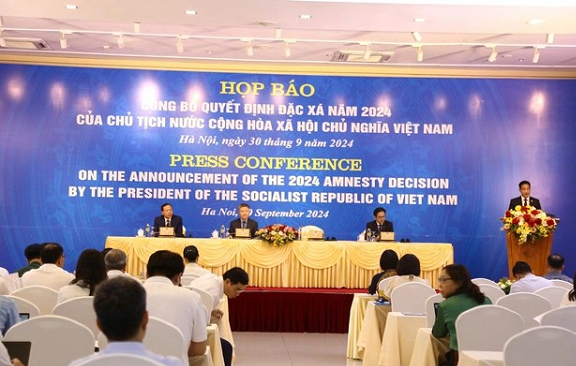Viet Nam grants amnesty for over 3,700 prisoners in 2024
VGP - President To Lam has decided to grant amnesty to 3,765 prisoners on the occasion of the 79th anniversary of National Day and the 70th anniversary of the Capital Liberation.

The press conference on the annoucement of the 2024 amnesty decision, September 30, 2024
Deputy Chief of the Presidential Office Pham Thanh Ha announced the decision at a press conference in Ha Noi on September 30.
Out of the detainees to be released, 20 foreigners came from Cambodia, China, Iceland, India, Laos, South Africa and the U.S.
The 2024 amnesty represents the humanitarian traditions of the Vietnamese people and the leniency policies of the Party and the State. It aims to encourage reformed offenders to reintegrate into society positively.
The amnesty also acknowledges the inmates' rehabilitation efforts and good behavior while incarcerated, representing a successful collaboration between the prisons, the inmates' families, related governmental bodies, and society in executing the Party and State's criminal policy strategies.
The process for selecting amnesty candidates was rigorous, transparent, fair, democratic, and in strict accordance with the law. It ensured that only those who truly met the legal conditions were considered, preventing any undeserving cases from being granted amnesty.
Additional penalties such as bans from holding certain positions, house arrest, fines, damages, and other civil obligations still apply to the pardoned individuals as mandated by law.
The amnesty also reflects the dual policy of strictness and leniency that characterizes Viet Nam's criminal justice approach - punishing wrongdoing while also providing opportunities for rehabilitation and societal reintegration.
Ha highlighted that amnesty demonstrates the superior and humane policies of the Party and State towards reformed criminals. It also showcases the national tradition of forgiveness and compassion.
Since 2009, Viet Nam has announced nine special amnesties, freeing over 92,000 prisoners./.
